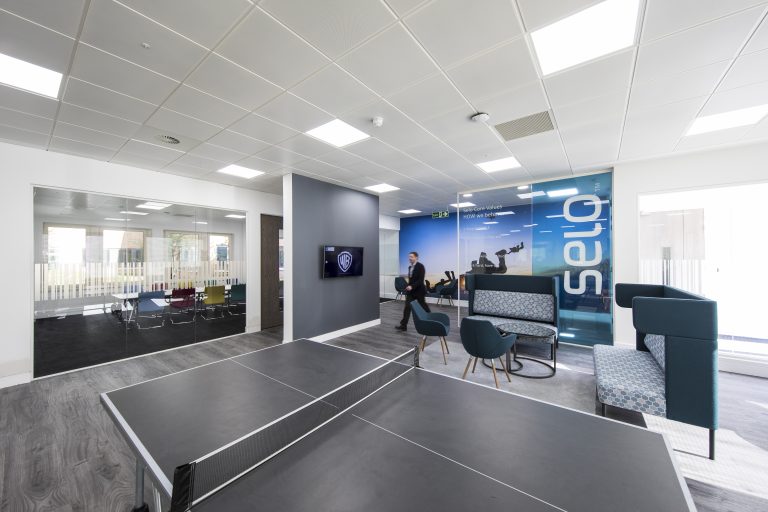There are 14,411 coworking spaces in the world today and research suggests that there could be over one million workers in coworking spaces by 2020!
But what exactly is coworking?
The coworking movement was developed by Brad Neuberg in 2005 when he decided to combine the independence of freelancers with the structure and community of an office space.
This is Brad.

A piece on coworker.com explains that coworking is not just about the sharing of infrastructure and cost, “it is about belonging to a community, accessibility and sustainability. Coworking spaces are designed to provide a productive and collaborative environment for their dynamic inhabitants.”
Now a lot of people have heard of coworking and have an understanding of what it is but many are unsure whether it could be an option for their business. With this in mind, we wanted to share our thoughts with you on the pros and cons of coworking environments.
The Pros!
Networking
Coworking offices come with opportunities to network, socialise and learn from other businesses and they often attract like-minded people so you could easily meet people with valuable skills for your business. Or, even better, you may find new clients! The culture within shared spaces is invaluable to the people that use them. For example, if you run a small business, a startup or work for yourself, the sense of community can be infectious, comforting and inspiring.

Flexibility and Convenience
When somebody mentions the word coworking, the first thing that a lot of people think of is flexibility. When it comes to coworking you are less likely to have year-long lease requirements and you have access to cost options that don’t include upfront fees and deposits. All of this presents valuable opportunities to keep your costs down. These environments also offer flexible space options such as hot seat, private desk, and high-level office memberships, which can be offered on a month-by-month basis.
Then we come to convenience. When moving to a new office you want your team to be productive immediately. Nobody enjoys setting up the printer, the scanner or the coffee maker and with coworking spaces, you don’t have to. This is all taken care of for you. Some environments even handle mail packages, electricity and internet bills on behalf of residents. It’s all part of the service.
Structure
For those that don’t have a permanent work base or that work predominantly from home, you may sometimes miss the dynamic environment that an office can bring. For example, if your home is not set up as a productive space it can be very easy to get distracted. In coworking spaces, you have the opportunity to use a variety of areas that are specifically designed for high focus work, collaboration or open plan working if you are craving more of an atmosphere. It’s the best of both worlds!
The Cons!
Lack of Customisation
A clear advantage of having your own office is having the ability to freely display your brand and your values throughout the design and décor of the space. This, of course, is not an option in coworking spaces. Generally speaking, the more you are willing to pay, the higher quality the coworking space will be. When we say high quality we mean designed well, highly functional, a nice balance of spaces and generally pleasant to work in.
For any business, but particularly a growing startup, it’s important to establish a unique company culture. In a shared office environment, there is a chance that the culture of your team could begin to mirror that of the coworking space they are using. To reduce the chances of this, it is important to find a shared environment that has similar values and culture to your business.

Distractions
Although coworking spaces can provide focus and inspiration for some, others find them to be full of distractions. As an example, these buildings are often located in popular areas of the city. It can get very crowded, which can make it hard to focus. Coworking offices are less structured when you compare them with traditional office spaces as they tend to be more sociable environments. So, depending on the different work styles and personalities in your team, a coworking space could generate more challenges around focus, distraction and wellbeing if it is not well aligned.
Competition and Lack of Privacy
For a lot of people, this is the dealbreaker. High-level privacy can be hard to achieve in coworking spaces. After all, they are designed to be shared. When it comes to the interior design, a lot of companies that run coworking environments will use glass to maximise natural light within the space. This creates more of an open plan feel. If you have confidential calls to make, there is a risk you may struggle to do it privately and as mentioned earlier, coworking spaces often attract people from similar industries so it is good to be aware of who you are sharing the space with. Remember, it could be your competition.
So..."To be or not to be? That is the question."
As with most things this really does depend on the culture of your business, the combination of personalities within your team and the style in which you want your business to work.
In theory, Coworking has something to offer for a variety of business models but if you are a startup, somebody who flies solo or a business that needs to generate more flexibility, coworking certainly comes with more overall advantages for you.

